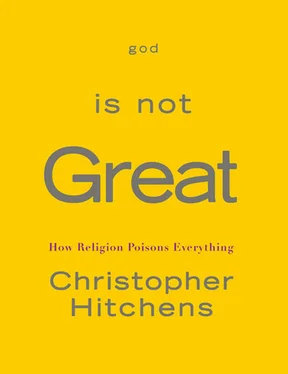There was always an alternative, in the form of the secular position taken by Nehru and Rajagopalachari, who would have traded a British promise of immediate postwar independence for a common alliance, on the part of both India and Britain, against fascism. In the event, it was in fact Nehru and not Gandhi who led his country to independence, even at the awful price of partition. For decades, a solid brotherhood between British and Indian secularists and leftists had laid out the case for, and won the argument for, the liberation of India. There was never any need for an obscurantist religious figure to impose his ego on the process and both retard and distort it. The whole case was complete without that assumption . One wishes every day that Martin Luther King had lived on and continued to lend his presence and his wisdom to American politics. For “the Mahatma,” who was murdered by members of a fanatical Hindu sect for not being devout enough , one wishes that he could have lived if only to see what damage he had wrought (and is relieved that he did not live to implement his ludicrous spinning-wheel program).
THE ARGUMENT THAT RELIGIOUS BELIEF improves people, or that it helps to civilize society, is one that people tend to bring up when they have exhausted the rest of their case. Very well, they seem to say, we cease to insist on the Exodus (say), or the Virgin Birth or even the Resurrection, or the “night flight” from Mecca to Jerusalem. But where would people be without faith? Would they not abandon themselves to every kind of license and selfishness? Is it not true, as G. K. Chesterton once famously said, that if people cease to believe in god, they do not believe in nothing but in anything?
The first thing to be said is that virtuous behavior by a believer is no proof at all of—indeed is not even an argument for—the truth of his belief. I might, just for the sake of argument, act more charitably if I believed that Lord Buddha was born from a slit in his mother’s side. But would not this make my charitable impulse dependent upon something rather tenuous? By the same token, I do not say that if I catch a Buddhist priest stealing all the offerings left by the simple folk at his temple, Buddhism is thereby discredited. And we forget in any case how contingent all this is. Of the thousands of possible desert religions there were, as with the millions of potential species there were, one branch happened to take root and grow. Passing through its Jewish mutations to its Christian form, it was eventually adopted for political reasons by the Emperor Constantine, and made into an official faith with—eventually—a codified and enforceable form of its many chaotic and contradictory books. As for Islam, it became the ideology of a highly successful conquest that was adopted by successful ruling dynasties, codified and set down in its turn, and promulgated as the law of the land. One or two military victories the other way—as with Lincoln at Antietam—and we in the West would not be the hostages of village disputes that took place in Judaea and Arabia before any serious records were kept. We could have become the votaries of another belief altogether—perhaps a Hindu or an Aztec or a Confucian one—in which case we should still be told that, strictly true or not, it nonetheless helped teach the children the difference between right and wrong. In other words, to believe in a god is in one way to express a willingness to believe in anything. Whereas to reject the belief is by no means to profess belief in nothing.
I once watched the late Professor A. J. Ayer, the distinguished author of Language, Truth and Logic and a celebrated humanist, debate with a certain Bishop Butler. The chairman was the philosopher Bryan Magee. The exchange proceeded politely enough until the bishop, hearing Ayer assert that he saw no evidence at all for the existence of any god, broke in to say, “Then I cannot see why you do not lead a life of unbridled immorality.”
At this point “Freddie,” as his friends knew him, abandoned his normal suave urbanity and exclaimed, “I must say that I think that is a perfectly monstrous insinuation.” Now, Freddie had certainly broken most commandments respecting the sexual code as adumbrated from Sinai. He was, in a way, justly famous for this. But he was an excellent teacher, a loving parent, and a man who spent much of his spare time pressing for human rights and free speech. To say that his life was an immoral one would be a travesty of the truth.
From the many writers who exemplify the same point in a different way, I shall select Evelyn Waugh, who was of the same faith as Bishop Butler, and who did his best in his fiction to argue for the operations of divine grace. In his novel Brideshead Revisited he makes a very acute observation. The two protagonists, Sebastian Flyte and Charles Ryder, the first of whom is heir to an old Catholic nobility, are visited by Father Phipps, who believes that all young men must be passionately interested in cricket. When disabused of this notion, he looks at Charles “with the expression I have seen since in the religious, of innocent wonder that those who expose themselves to the dangers of the world should avail themselves so little of its varied solace.”
Thus I rescrutinize Bishop Butler’s question. Was he in fact not telling Ayer, in his own naive way, that if freed from the restraints of doctrine he himself would choose to lead “a life of unbridled immorality”? One naturally hopes not. But much empirical evidence exists to reinforce the suggestion. When priests go bad, they go very bad indeed, and commit crimes that would make the average sinner pale. One might prefer to attribute this to sexual repression than to the actual doctrines preached, but then one of the actual doctrines preached is sexual repression… Thus the connection is unavoidable, and a litany of folkloric jokes have been told by all lay members of the church ever since religion began.
Waugh’s own life was far more stained by offenses against chastity and sobriety than was the life of Ayer (only it seemed to bring less happiness to the former than to the latter), and in consequence he was often asked how he reconciled his private conduct with his public beliefs. His reply has become celebrated: he asked his friends to imagine how much worse he would be if he were not a Catholic. For a believer in original sin this might have served as a turning of the tables, but any examination of Waugh’s actual life shows that its most wicked elements arose precisely from his faith. Never mind the sad excesses of drunkenness and marital infidelity: he once sent a wedding telegram to a divorced and now remarried friend telling her that her nuptial night would increase the loneliness of Calvary and add to the spittle on the face of Christ. He supported fascist movements in Spain and Croatia, and Mussolini’s foul invasion of Abyssinia, because they enjoyed the support of the Vatican, and he wrote in 1944 that only the Third Reich now stood between Europe and barbarism. These deformities in one of my most beloved authors arose not in spite of his faith, but because of it. No doubt there were private acts of charity and contrition, but these could equally well have been performed by a person of no faith at all. To look no further than the United States, the great Colonel Robert Ingersoll, who was the nation’s leading advocate of unbelief until his death in 1899, maddened his opponents because he was a person of immense generosity, a loving and constant husband and father, a gallant officer, and the possessor of what Thomas Edison with pardonable exaggeration called “all the attributes of a perfect man.”
In my own recent life in Washington, I have been bombarded with obscene and menacing phone calls from Muslims, promising to punish my family because I do not support a campaign of lies and hatred and violence against democratic Denmark. But when my wife accidentally left a large amount of cash on the backseat of a taxi, the Sudanese cab driver went to a good deal of trouble and expense to work out whose property this was, and to drive all the way to my home to return it untouched. When I made the vulgar mistake of offering him 10 percent of the money, he made it quietly but firmly plain that he expected no recompense for performing his Islamic duty. Which of these two versions of faith is the one to rely upon?
Читать дальше












